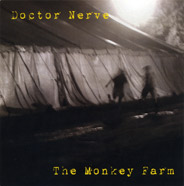
Doctor Nerve
The Monkey Farm
(Punos Music)
Coming almost ten years after the release of Doctor Nerve’s last album, Ereia,
the recently released The Monkey Farm made me think about how much I really
miss the US group. I obviously don’t know whether my feeling is widely
shared today, though in a way I suppose that the circumstance of the group
being inactive for the best part of the decade – this after having released
many interesting, not at all "difficult", works (still not impossible
to get, by the way) for about fifteen years, could in a way be considered
as a kind of answer of some sort.
I have to confess I felt a bit let down when I read in the CD liner notes that
the material featured on this album was recorded (live, at the glorious
New York venue called Roulette) on May 4, 2001. So it’s not the group getting
together again for a new start, just a nice episode from the past. Which,
together with the peculiar nature of this work, could maybe explain the
fact of The Monkey Farm being released by Punos Music, the personal label
of group leader Didkovsky.
Again,
we find the familiar line-up: Greg Anderson on electric bass; Leo Ciesa
on drums; Nick Didkovsky on tabletop guitar, computer, and conducting;
Yves Duboin on soprano sax; Rob Henke on trumpet; Michael Lytle on bass
clarinet; Kathleen Supové on laptop. We also find the by now familiar mix
of "martial"
rhythms, free jazz echoes, daring stylistic combinations, and surprises.
The
biggest surprise here being the presence of Valeria Vasilevski (who I read
is a theatre director of some renown) as the narrator, and the nature of
the work itself: The Monkey Farm sees Didkovsky’s music coupled with Charles
O’Meara’s (who’s maybe still better known under the name Vrtacek – I’m
pretty sure some readers are familiar with at least some of his solo albums,
and with his group called Forever Einstein) texts, all brief (and it appears,
true) stories dealing with O’Meara’s childhood.
Didkovsky’s
music comments on and completes the lyrics in ways that are never banal.
It has to be added that Vasilevski’s voice gets warped in real time by
a special software designed by Phil Burk, Robert Marsanyi, and Didkovsky
himself. Thirty-six brief episodes appear, total duration being about 1h.
Though the work is never less than good, I’m afraid its peculiarity will have
as effect a kind of "selective" appreciation. It goes without
saying that one has to understand English, but it has to be noticed that
all lyrics – which are far from difficult to get by listening alone – are
available online.
Maybe due to my lack of many reference points, some vocal parts reminded me
more than a bit of some episodes from Laurie Anderson’s catalogue (the
music itself being quite different, of course). Some episodes featuring
treated voice and strange backing made me think of Zappa’s Lumpy Gravy,
with certain passages for winds reminding me of the epic-filmic symphonic
flavour of 200 Motels. Also, the instrumental part of Broken Wrist And
Sympathy didn’t sound to me too far from the acid, jazzy Mothers Of Invention
on an album like Weasels Ripped My Flesh. But reference points are many
and diverse, of course, starting with many different strains of cartoon
music, and music we readily associate with many kinds of movie
"genres".
We also have several instrumental episodes, for instance the whole series of
pieces whose title start with the word Salvo; also The Ghost And The Goiter,
Arguing About Money, and Another Problem Solved By Violence. The whole "vocal
treatments" chapter is quite fascinating, indeed. I also especially
liked the computer part on Guitar Pick.
Beppe Colli
© Beppe Colli 2009
CloudsandClocks.net | Oct. 18, 2009


